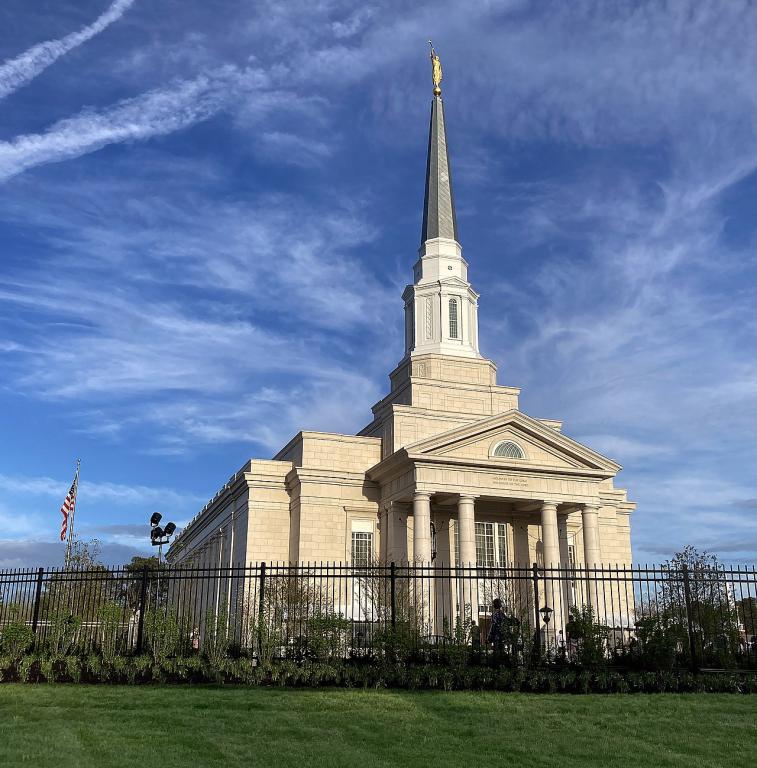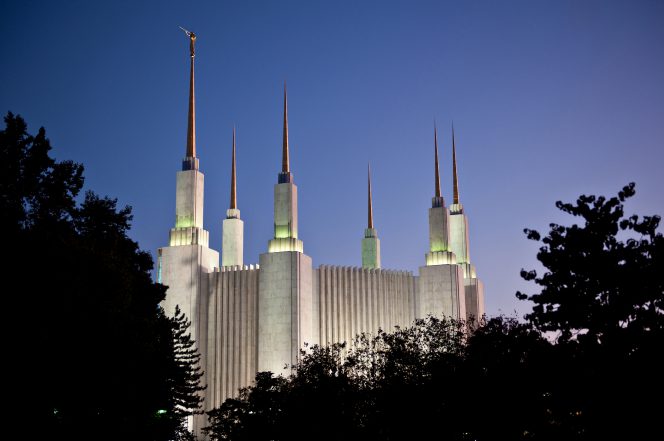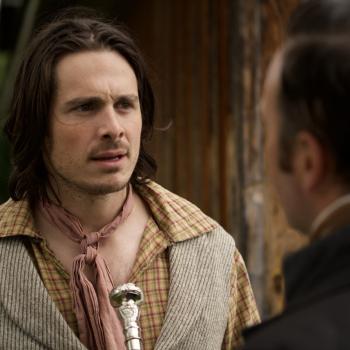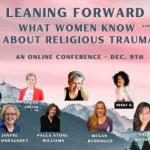
(Wikimedia Commons public domain image)
Newly posted on the website of the Interpreter Foundation: “Conference Talks: From Temple to Church: Defining Sacred Space in the Near East,“ presented by David Calabro on Saturday, 7 November 2020, as part of the Interpreter Foundation’s 2020 Temple on Mount Zion Conference:
“In this paper, I propose to revisit the question posed by Hugh Nibley, “What Is a Temple?” in Mormonism and Early Christianity (Salt Lake City and Provo, 1987), 355-90, and by John Lundquist, “What Is a Temple? A Preliminary Typology,” in Temples of the Ancient World, ed. Donald Parry (Salt Lake City and Provo, 1994), 83-117. This study has two parts: (1) to address the general issue of typology in light of ancient temples that challenge the points made by Nibley and Lundquist; and (2) to apply this refined understanding of temples to the issue with which Nibley’s essay began, namely the Early Christian transition from temple-based Judaism to the Constantinian basilica of the fourth century. I will argue that some Christians of the second and early third centuries did have places of worship that, while not monumental in scale, qualify typologically as temples and were understood as such. In support of this thesis, I will take as case studies the Christian places of worship at ancient Edessa and Dura Europos, based on a combination of textual sources and archaeological remains.”

And now, as if anybody out there really cares, I’m going to try to stuff — and that verb seems seasonally appropriate, doesn’t it? — I’m going to try to stuff three past Thanksgiving columns, originally written for the Deseret News, into one blog post. Here they are:
2011
Autumn harvest festivals were and are common across Europe, and, as every American schoolchild once learned, our modern Thanksgiving celebrations descend from a meal shared between Massachusetts Pilgrims and Native Americans in 1621.
It was not until 3 October 1863, however, that a uniform national holiday was established by presidential proclamation. Writing well into the Civil War, Abraham Lincoln declared that
“The year that is drawing towards its close, has been filled with the blessings of fruitful fields and healthful skies. To these bounties, which are so constantly enjoyed that we are prone to forget the source from which they come, others have been added, which are of so extraordinary a nature, that they cannot fail to penetrate and soften even the heart which is habitually insensible to the ever watchful providence of Almighty God.”
After enumerating a substantial and very specific list of material blessings, Lincoln continued.
“No human counsel hath devised nor hath any mortal hand worked out these great things. They are the gracious gifts of the Most High God, who, while dealing with us in anger for our sins, hath nevertheless remembered mercy. It has seemed to me fit and proper that they should be solemnly, reverently and gratefully acknowledged as with one heart and one voice by the whole American People. I do therefore invite my fellow citizens in every part of the United States, and also those who are at sea and those who are sojourning in foreign lands, to set apart and observe the last Thursday of November next, as a day of Thanksgiving and Praise to our beneficent Father who dwelleth in the Heavens. And I recommend to them that while offering up the ascriptions justly due to Him for such singular deliverances and blessings, they do also, with humble penitence for our national perverseness and disobedience, commend to His tender care all those who have become widows, orphans, mourners or sufferers in the lamentable civil strife in which we are unavoidably engaged, and fervently implore the interposition of the Almighty Hand to heal the wounds of the nation and to restore it as soon as may be consistent with the Divine purposes to the full enjoyment of peace, harmony, tranquility and Union.”
It is a remarkable document—and not only for Abraham Lincoln’s characteristic eloquence.
One is struck, for example, by Lincoln’s sense of gratitude even amidst horrible death, destruction, and tragedy. The great battle at Gettysburg had concluded precisely three months before, and Lincoln himself would fall as one of the Civil War’s last victims only eighteen months later. Yet he calls for national thanksgiving to God.
It’s also impossible to miss the overt religiousness of the statement, and difficult to imagine a similar document emerging from any recent White House. Lincoln writes without embarrassment of God’s grace and paternal care, and, perhaps even more notably today, of our sins and “perverseness and disobedience,” recognizing an authority far higher than his own that rules all human affairs and overrules all human power.
And this authority, Lincoln plainly understands, is a Person. Lincoln doesn’t merely advise his fellow citizens to be satisfied that their fields are productive and to be happy at good weather. He counsels them to recognize a living, willing, conscious Being behind those “gifts,” and to thank that Being for them.
To recognize a divine Person behind nature and human history, to perceive an ultimate and inconceivably powerful Will beneath and beyond the shifting phenomena of our lives and the world, is a characteristic mark of the religious attitude—and submission to that Will, and gratitude to that Person, are among the virtues advocated by all religions of the Abrahamic tradition and most religions worldwide.
Anybody can be happy with his or her material state, satisfied that things are going well, relieved that they’re not going as badly as they could have gone. And everybody should, if possible, devote Thanksgiving Day to strengthening relationships with family and friends. (Most of us, nowadays, eat so very well throughout the year that the Thanksgiving meal in itself is, relatively speaking, unimportant. This isn’t just “Turkey Day”; Lincoln’s proclamation says nothing about food.)
But thanks can only meaningfully be given to persons. Thus, if Thanksgiving is to be practiced as the sixteenth president of the United States—perhaps our greatest—advised, it must expressly involve gratitude to God.
2012
William Ernest Henley’s famous Victorian-era poem “Invictus” provided the title and the theme for Clint Eastwood’s inspiring 2009 film about Nelson Mandela. It also provided the memorable claim “I am the master of my fate: I am the captain of my soul.”
It’s a stirring assertion, and, in a very real sense, true. A great proportion of what we are and do rests upon our own decisions.
But not everything, and perhaps not the most important things. Henley’s claim is also false and misleading.
As I write, a friend and neighbor is recuperating from a catastrophic fall that lacerated his face, took out most of his teeth, broke major bones everywhere in his body, and very nearly killed him. As he plunged groundwards, he certainly wasn’t the master of his fate, and he’s scarcely more so as he lies in a hospital bed. Those who’ve surveyed the spot where he landed, closely bordered by objects that could instantly have ended his life, regard his survival as a miracle, and he himself, speaking with difficulty, testifies to it.
“I thank whatever gods may be,” says Henley, “for my unconquerable soul.”
Thirty years ago, my wife and I traveled with our infant son from southern California to her parents’ house in Denver, Colorado, where the whole extended family were gathering for a Christmas trip to Florida. We participated in a “Messiah” sing-along and then went home to prepare for our flight to Orlando the next morning.
But then came what’s been called “the Christmas Eve blizzard of 1982.” Stapleton International Airport closed at 9:30 AM on 24 December, remained closed for fully thirty-three hours, and then, for several days thereafter, was open only for severely limited operations. Ten-foot-high snowdrifts were left throughout greater Denver, highways into and out of the city were shut down, power outages darkened large portions of the metropolitan area, roofs collapsed, supermarkets closed because their employees couldn’t get to work, hospitals were reduced to minimal staff on emergency power, and snowmobiles dominated suburban streets.
It was astounding to me, and revealing, to realize how easily simple snowfall could shut down a major modern city quite accustomed to seeing it.
We’re plainly not entirely the masters of our fates, the captains of our souls. Rather, as Elder Orson F. Whitney (d. 1931) of the Quorum of the Twelve Apostles put it in “The Soul’s Captain,” his response to “Invictus,” “Men are as bubbles on the wave, as leaves upon the tree.”
We’re fragile creatures. A few days without food, even fewer without water, a few minutes without oxygen, and we’re gone. If our hearts miss just a few beats, none of our plans, ambitions, schemes, or careful investments will mean a thing. And, in the end, no matter how we fight it, we’ll die.
Our comfort and survival in the meantime depend upon cycles of evaporation and precipitation that few of us really understand, and we rely upon complex networks of exchange and transportation that very few of us could begin to explain.
The ground on which most of us live and where our food is grown was cleared of rocks, trees, and stumps by millions of hardworking people whose names we’ve forgotten. Our cities—big and small—feature large buildings erected by generations of construction workers to whom we’ve probably never given the slightest thought.
We owe a debt of gratitude that we can never repay. “For behold, are we not all beggars? Do we not all depend upon . . . God, for all the substance which we have, for both food and raiment, and for gold, and for silver, and for all the riches which we have of every kind?” (Mosiah 4:19). The Book of Mormon’s Amulek wisely counsels us that we should “humble ourselves even to the dust, and worship God, in whatsoever place we may be in, in spirit and in truth; and that we live in thanksgiving daily, for the many mercies and blessings which he doth bestow upon us” (paraphrased slightly from Alma 34:38).
In the United States of America, where many of us are gathering together as families and friends for the Thanksgiving holiday, this is an exceptionally appropriate day for us to remember the debt that we owe to those who’ve preceded us and to God, “in whom we live, and move, and have our being” (Acts 17:28).
2013
It’s the season of Thanksgiving and, so, minds like mine turn naturally to etymology, to word origins. Please be patient. There is method in my madness.
The origin of the word “religion” is obscure, and has been much debated. But all suggestions for it seem to agree that remembrance, an awareness of dependence and obligation, is at the core of what it means to be religious. The ancient Roman politician and writer Cicero derived the word from “legere,” “to read,” believing that it meant “to go over” something again in the sense of “re-reading,” “re-thinking” or considering it very carefully. Other writers, ancient and modern, connect it with the word “religare,” “to bind fast,” from which we also receive our modern verb “to rely.” They emphasize the bond between humans and the divine. Still others suggest a distant relationship to the archaic English verb “to reck” or “to reckon,” meaning “to pay attention to,” or that it stems from the Latin adjective “religiens,” “careful” or “mindful,” which is the opposite of “negligens.”
Most if not all religions are saturated with exhortations to remember, and with practices designed to help us to do so. The liturgical year of many Jews and Christians, for example, is a profound teaching device centered on events (e.g., Passover, Easter, the Day of Atonement, the Feast of Tabernacles, Hannukah, and Christ’s Nativity) that are charged with deep meaning for believers. The Qur’an continually encourages readers to “remember,” and not to be “neglectful” or “heedless” of the mighty acts of God, and it condemns those who fail to reflect on the lessons of the past.
In the Mormon context, the most obvious example of memorializing is the weekly sacrament. Those who partake are to do so “in remembrance” of Christ’s suffering on their behalf, and to “always remember him.” But examples abound. The ordinances of the temple remind us, for instance, that the creation of the world was purposeful, and that we can only enter into his presence again through the wounds he suffered in his atoning sacrifice. The scriptures were essential, Alma taught his son Helaman, because they “enlarged the memory of this people” (Alma 37:8); had they not been preserved, explained King Benjamin (in Mosiah 1:3-5), the Nephites would have fallen into “ignorance” and “dwindled in unbelief.” Hence the vital importance, even today, of repeatedly immersing ourselves in the scriptures, which continually admonish us to “remember.”
Even such modern programs as Pioneer Day celebrations throughout the Church and reenactments of the handcart treks in Africa, Europe, and the Philippines, as well as in Wyoming, allow us to “remember,” and to make ourselves one with our spiritual progenitors (whether or not we are biological kin). Just as the nineteenth century pioneers saw themselves as a modern Israel led by an American Moses, we are to identify with them, and, thus, with the ancient people of the Exodus. Latter-day Saints are to relive the experience, in their own way, of former-day Saints. “I did liken all scriptures unto us,” Nephi explains, “that it might be for our profit and learning” (1 Nephi 19:23)
Abraham Lincoln’s proclamation of a national “day of Thanksgiving and Praise,” issued 150 years ago on October 3, 1863, was a summons to explicitly religious reflection on the many blessings that the American people had received even amidst the sadness, death, and destruction of the still ongoing Civil War. While it says precisely nothing about turkey, stuffing, cranberry sauce, or pumpkin pie, it calls upon the nation to remember “our beneficent Father who dwelleth in the heavens” and, in “humble penitence for our national perverseness and disobedience,” to seek his caring help for all those who were suffering.
On this Thanksgiving Day, accordingly, it is worthwhile to recall that the English verb “to thank” derives from the same root as the verb “to think.” (Compare the equivalent German words “danken” and “denken.”) With all the busyness and the rush of the day, we should still try to find time to reflect.
Thanksgiving isn’t about eating. It isn’t even, really, about spending time with family and friends, important as those are. It is, or should be, about thinking, about contemplation. From its very origin, it was about considering the debt that we owe to God and to the others who laid the foundation of the blessings and prosperity that we enjoy, about reflecting, repenting, and seeking to extend those blessings to others.
Posted from Richmond, Virginia













